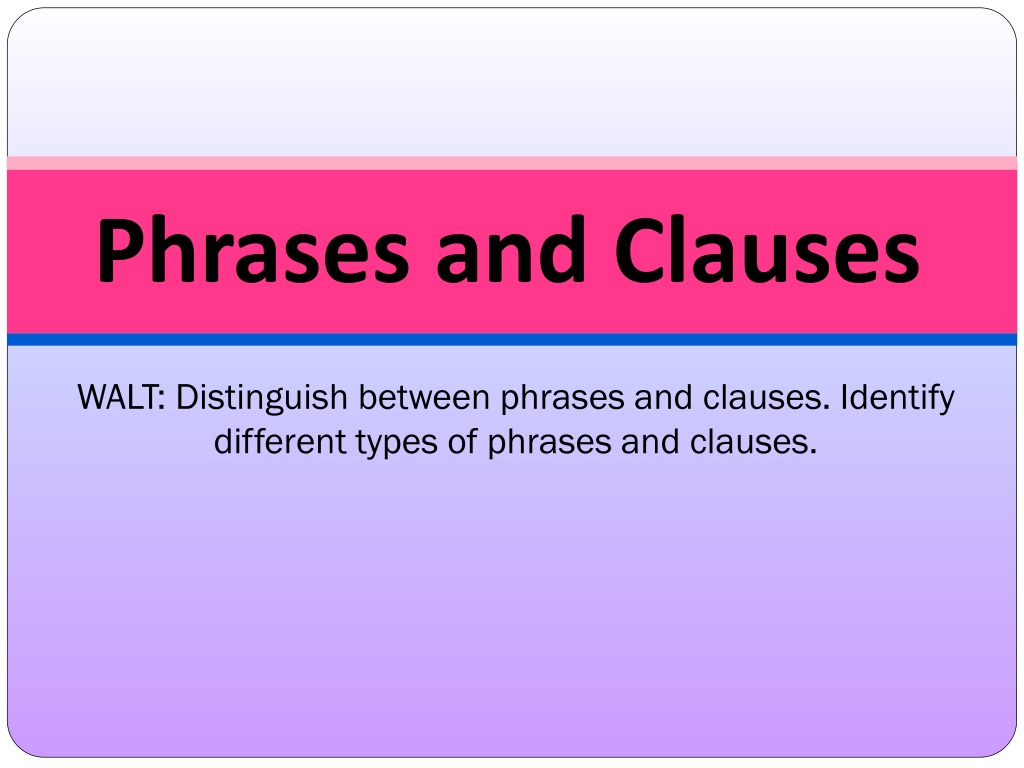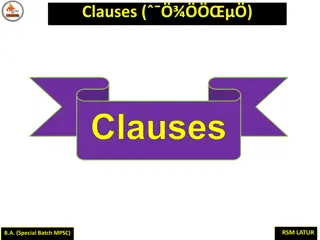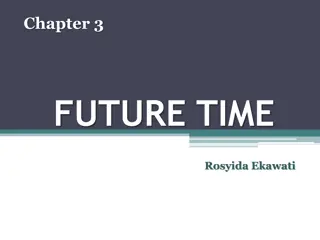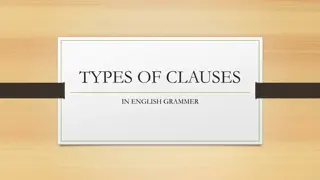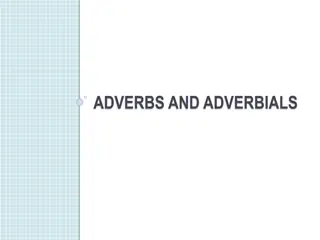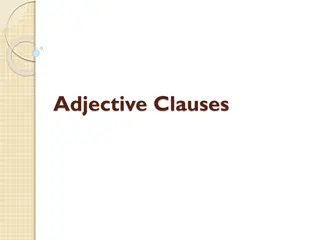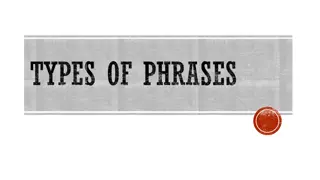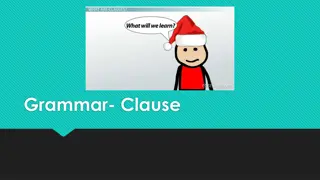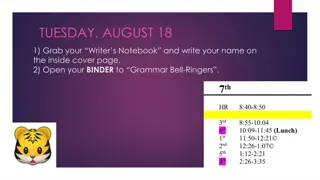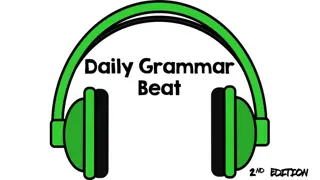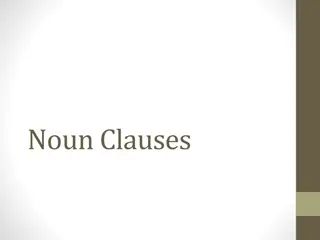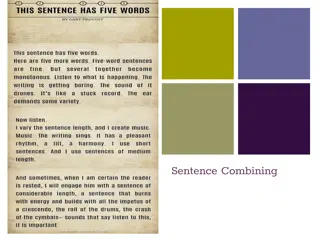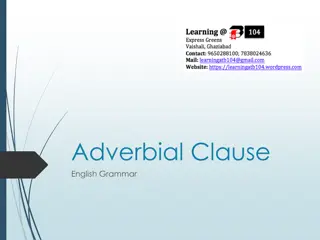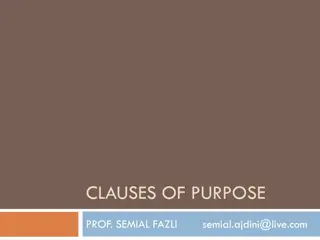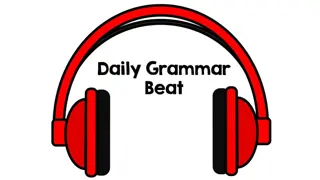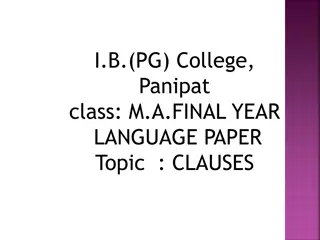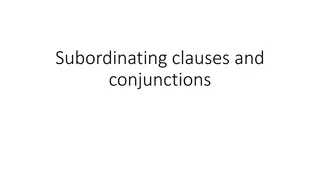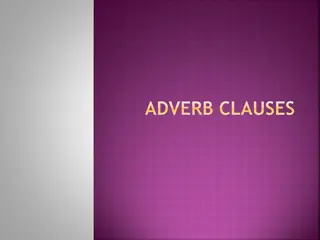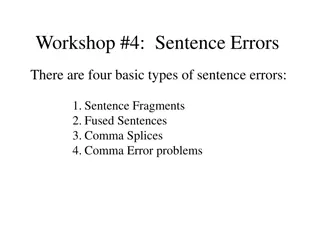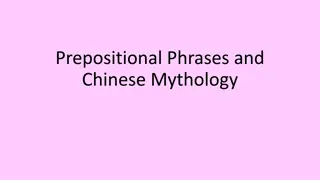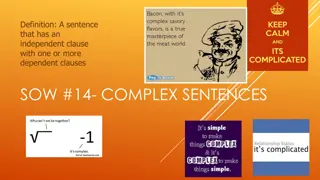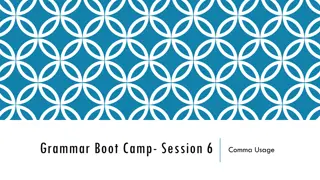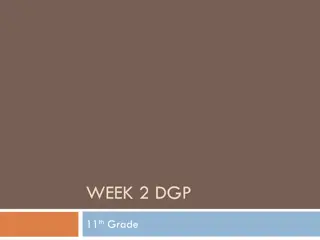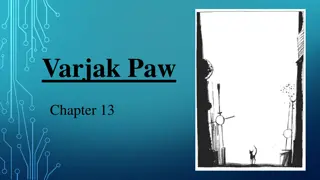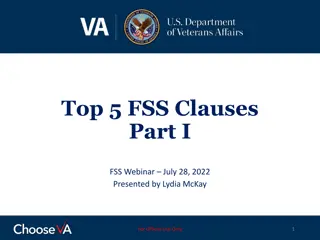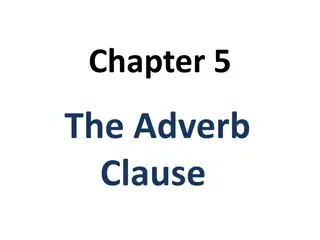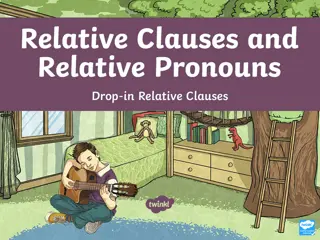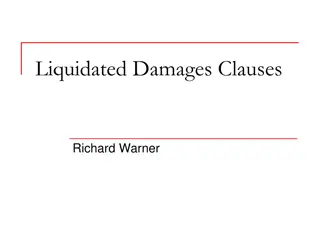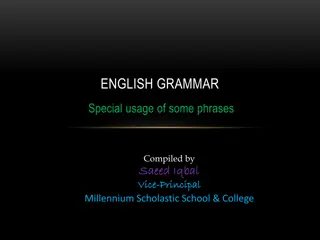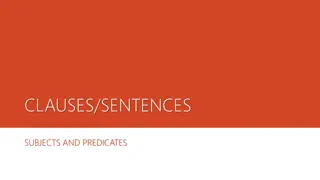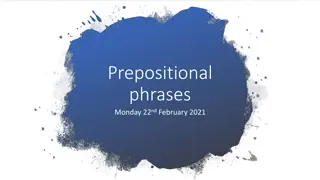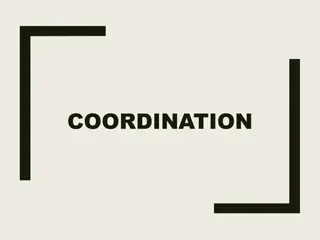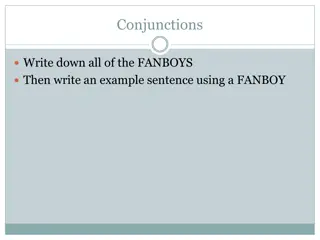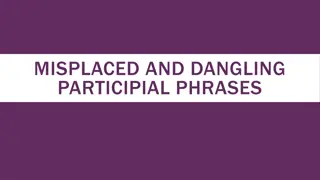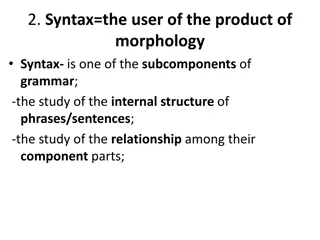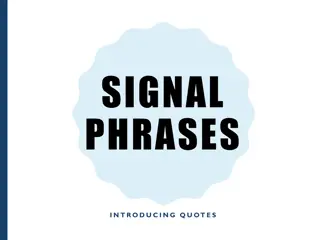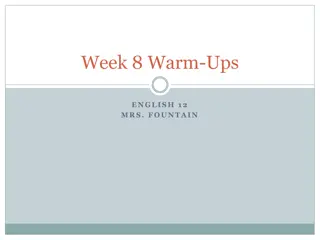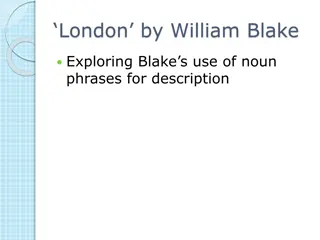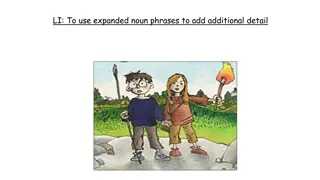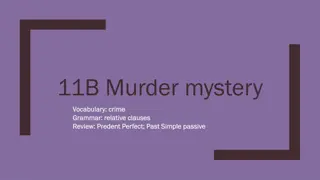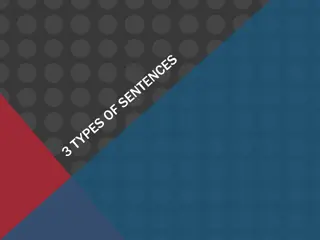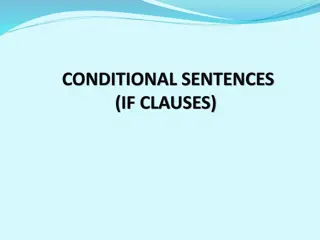Understanding Phrases and Clauses in Grammar
Distinguish between phrases and clauses, identify types of phrases and clauses, explore word classifications, and learn how words function in different contexts within sentences. Understand the roles of subjects, objects, and verbs in sentences as well.
Download Presentation

Please find below an Image/Link to download the presentation.
The content on the website is provided AS IS for your information and personal use only. It may not be sold, licensed, or shared on other websites without obtaining consent from the author. Download presentation by click this link. If you encounter any issues during the download, it is possible that the publisher has removed the file from their server.
E N D
Presentation Transcript
Phrases and Clauses WALT: Distinguish between phrases and clauses. Identify different types of phrases and clauses.
Words The alphabet contains 26 letters; 5 vowels and 21 consonants. These letters come together to make words. We can sort words into eight eight main types: Determiner Determiner Verb Verb Adjective Adjective Adverb Adverb Noun Noun Conjunction Preposition Preposition Conjunction Pronoun Pronoun
Words *** BE CAREFUL *** *** BE CAREFUL *** NOT have a word class until they are used in a sentence. It is the role the word plays in a sentence that makes it a noun or a verb etc. Words do NOT
For example... Do you think the word cook The answer is that it DEPENDS sentence: cook is a noun or a verb? DEPENDS on how it is used in the In this sentence cook is a verb it is what we will be doing. verb We will We will cook cook dinner. dinner. Here cook is a noun noun it is the name of something. The The cook cook chopped onions. chopped onions. TIP TIP: we know cook is functioning as a noun because it is introduced by a determiner determiner.
Words There are many words which can function differently to how you might expect. How would you classify each of the words written in bold? How would you classify each of the words written in bold? Sentence Sentence The towering towering oak tree. We must chip chip it away. Vivian rose to her feet and smelt a rose Sam sat on his behind behind. A motor motor- -car car engine. A motor motor- -car car engine. A motor motor- -car car engine. A motor motor- -car car engine. A motor motor- -car car engine. Sentence Sentence Sentence Sentence Sentence Sentence Sentence Sentence Sentence Sentence Word Class Word Class Word Class Word Class Adjective Adjective Verb Verb Noun Noun Noun Noun Adjective Word Class Word Class Word Class Word Class Adjective Adjective Verb Verb Noun Word Class Word Class Word Class Word Class Adjective The towering towering oak tree. We must chip chip it away. Vivian rose to her feet and smelt a rose Sam sat on his behind behind. Sam sat on his behind behind. Sam sat on his behind behind. Sam sat on his behind behind. The towering towering oak tree. We must chip chip it away. Vivian rose to her feet and smelt a rose Vivian rose to her feet and smelt a rose Vivian rose to her feet and smelt a rose The towering towering oak tree. We must chip chip it away. We must chip chip it away. The towering towering oak tree. The towering towering oak tree. We must chip chip it away. Vivian rose to her feet and smelt a rose Sam sat on his behind behind. A motor motor- -car car engine. rose. rose. rose. rose. rose. rose.
RECAP We are now going to look at what happens when we starting joining words together. But first, can you tell me the subject, object and verb in this sentence?.. Milkshake Milkshake is the object object it is what is affected by or receiving the action. Rex Rex is the subject subject the person doing the action. Rex Rex drank drank milkshake milkshake. . Drank Drank is the verb action being completed. verb it is the Being able to identify the SOV will help you to decide how a group of words is functioning.
Phrases When words joins together they make a phrase There are several different types of phrase. phrase.
Noun Phrase A noun phrase noun phrase is a group of words which tell you more about a noun. For example: The eerie abandoned cottage.
Noun Phrase A noun phrase noun phrase is a group of words which tell you more about a noun. For example: Cottage is a noun the name of something. noun it is The eerie abandoned eerie abandoned cottage cottage. Eerie and abandoned are adjectives adjectives they are describing the noun. But together this a noun phrase more about the cottage. noun phrase because it tells you
Noun Phrase Can you identify the noun phrases? Can you identify the noun phrases? I found a brand new pair of trainers. I found a brand new pair of trainers. brand new pair of trainers. Homemade carrot and orange cake tastes delicious. Homemade carrot and orange cake Homemade carrot and orange cake tastes delicious. Almost all healthy adult foxes can swim. Almost all healthy adult foxes Almost all healthy adult foxes can swim. Remember Remember: a noun phrase only (modifies) a noun. only gives more information about
Adverbial Phrase An adverbial phrase adverbial phrase is a group of words which function like an adverb. They tell you HOW, WHEN, WHY, WHERE or HOW MUCH an action has occurred. For example: Example Example Adverb Adverb Harry ran quickly. quickly. Adverbial Phrase Adverbial Phrase Harry ran as fast as he could. as fast as he could. As fast as he could is an adverbial phrase of words which tell us HOW adverbial phrase because it is a group HOW Harry ran.
Adverbial Phrase Can you identify the adverbial phrases? Can you identify the adverbial phrases? After several hours, we arrived at Grandma s house. After several hours After several hours, we arrived at Grandma s house. The cake tasted like heaven. The cake tasted like heaven. like heaven. Remember: an adverbial phrase tells you more about the verb. Fronted adverbials Fronted adverbials are always marked with a comma.
Preposition Phrase A preposition phrase preposition phrase is a group of words which begins with a preposition and ends with a noun or pronoun. They tell you the position or location of something. For example: The mouse hid under the wardrobe.
Preposition Phrase A preposition phrase preposition phrase is a group of words which begins with a preposition and ends with a noun or pronoun. They tell you the position or location of something. For example: under is a preposition you where the mouse is in relation to the preposition this phrase tells wardrobe. The mouse hid under the wardrobe under the wardrobe.
Phrases Take a look at some of the phrases we have talked about so far: the eerie abandoned cottage after several hours under the wardrobe VERBS VERBS Which very common word class is missing?.. Phrases which contain verbs have their own special title...CLAUSES CLAUSES
Clauses Phrases which contain a verb are called clauses A clause always contains a subject performing a always contains a subject performing a verb verb this is why being able to identify the SOV is so important! For example: clauses. We have a subject (Lily) performing a verb (ran) so this is a CLAUSE CLAUSE Lily Lily is the subject subject the person doing the action. Lily Lily ran ran ran ran is the verb action being completed. verb it is the
Phrase or Clause? Decide whether each example is a phrase or clause Decide whether each example is a phrase or clause Example Example Example Example Example Example Example Example Example Example Example Example Example Example Phrase or Clause? Phrase or Clause? Phrase or Clause? Phrase or Clause? Clause Clause Phrase Phrase Phrase Phrase Clause Clause Phrase Phrase Clause Phrase or Clause? Phrase or Clause? Phrase or Clause? Phrase or Clause? Clause Clause Phrase Phrase Phrase Phrase Clause Phrase or Clause? Phrase or Clause? Phrase or Clause? Phrase or Clause? Clause Clause Phrase Phrase or Clause? Phrase or Clause? Lola sang beautifully an abandoned ship the white flower the boys kicked the football opposite the park the wind howled fiercely the wind howled fiercely the wind howled fiercely the wind howled fiercely the wind howled fiercely the wind howled fiercely the wind howled fiercely Lola sang beautifully an abandoned ship the white flower the boys kicked the football opposite the park opposite the park opposite the park opposite the park opposite the park opposite the park Lola sang beautifully an abandoned ship the white flower the boys kicked the football the boys kicked the football the boys kicked the football the boys kicked the football the boys kicked the football Lola sang beautifully an abandoned ship the white flower the white flower the white flower the white flower Lola sang beautifully an abandoned ship an abandoned ship an abandoned ship Lola sang beautifully Lola sang beautifully
Clauses Just like phrases, there are several different types of clause.
Main Clause A main clause main clause contains a subject performing a verb. Every sentence contains at least one main clause. The main clause is the most important idea in the sentence. It expresses a complete thought and so makes sense on its own makes sense on its own. The clauses we looked at earlier are all main clauses. main clause. Example Example Lola sang beautifully. The boys kicked the football. The wind howled fiercely. Clause Clause Clause
Subordinate Clause A subordinate clause gives extra information about the main clause. It can come before or after the main clause but doesn t make sense on its own make sense on its own. doesn t The subordinate subordinate clause clause is less important, it just gives the reader a bit more detail. The main clause main clause contains the most important most important idea idea in the sentence. the
Subordinate Clause For example: This is the main clause main clause... It contains a subject (Harriet) performing a verb (caught) and makes sense on its own Although she was clumsy, Harriet caught the netball. , Harriet caught the netball.
Subordinate Clause For example: This is the main clause main clause... It contains a subject (Harriet) performing a verb (caught) and makes sense on its own Although she was clumsy Although she was clumsy, Harriet caught the netball. , Harriet caught the netball. This is a subordinate clause subordinate clause... It is not a complete idea and doesn t make sense without being attached to the main clause.
Main or Subordinate Clause? Decide whether the underlined section is a main clause or a Decide whether the underlined section is a main clause or a subordinate clause subordinate clause Example Example Example Example Example Example Example Example Example Example Example Example Example Example MC MC MC MC MC MC MC MC MC MC MC MC MC MC SC SC SC SC SC SC SC SC SC SC SC SC SC SC Emery arrived after the school bell had rung after the school bell had rung. Emery arrived after the school bell had rung after the school bell had rung. Emery arrived after the school bell had rung after the school bell had rung. Emery arrived after the school bell had rung after the school bell had rung. Emery arrived after the school bell had rung after the school bell had rung. Emery arrived after the school bell had rung after the school bell had rung. Emery arrived after the school bell had rung after the school bell had rung. Although I was terrified Although I was terrified, I crept up the creaking staircase. Although I was terrified Although I was terrified, I crept up the creaking staircase. Although I was terrified Although I was terrified, I crept up the creaking staircase. Although I was terrified Although I was terrified, I crept up the creaking staircase. Although I was terrified Although I was terrified, I crept up the creaking staircase. Although I was terrified Although I was terrified, I crept up the creaking staircase. Although I was terrified Although I was terrified, I crept up the creaking staircase. It was raining so we cancelled our picnic we cancelled our picnic. It was raining so we cancelled our picnic we cancelled our picnic. It was raining so we cancelled our picnic we cancelled our picnic. It was raining so we cancelled our picnic we cancelled our picnic. It was raining so we cancelled our picnic we cancelled our picnic. It was raining so we cancelled our picnic we cancelled our picnic. It was raining so we cancelled our picnic we cancelled our picnic. Despite it being Despite it being - -2 2 C C outside jumper to school! On Fridays we normally go swimming but today I forgot my kit kit. kit kit. kit kit. kit kit. kit kit. Despite it being Despite it being - -2 2 C C outside jumper to school! On Fridays we normally go swimming but today I forgot my kit kit. The The fox slinked through the dense undergrowth fox slinked through the dense undergrowth and pounced on the unsuspecting mouse. pounced on the unsuspecting mouse. pounced on the unsuspecting mouse. pounced on the unsuspecting mouse. pounced on the unsuspecting mouse. pounced on the unsuspecting mouse. pounced on the unsuspecting mouse. Despite it being Despite it being - -2 2 C C outside jumper to school! On Fridays we normally go swimming but today I forgot my kit kit. The The fox slinked through the dense undergrowth fox slinked through the dense undergrowth and The The fox slinked through the dense undergrowth fox slinked through the dense undergrowth and The The fox slinked through the dense undergrowth fox slinked through the dense undergrowth and The The fox slinked through the dense undergrowth fox slinked through the dense undergrowth and The The fox slinked through the dense undergrowth fox slinked through the dense undergrowth and The The fox slinked through the dense undergrowth fox slinked through the dense undergrowth and Despite it being Despite it being - -2 2 C C outside Despite it being Despite it being - -2 2 C C outside Despite it being Despite it being - -2 2 C C outside jumper to school! jumper to school! jumper to school! Despite it being Despite it being - -2 2 C C outside jumper to school! On Fridays we normally go swimming but today I forgot my On Fridays we normally go swimming but today I forgot my On Fridays we normally go swimming but today I forgot my On Fridays we normally go swimming but today I forgot my outside, Frank still didn t bring his outside, Frank still didn t bring his outside, Frank still didn t bring his outside, Frank still didn t bring his outside, Frank still didn t bring his outside, Frank still didn t bring his outside, Frank still didn t bring his today I forgot my today I forgot my today I forgot my today I forgot my today I forgot my today I forgot my today I forgot my
Clause So far we have looked at two types of clause: main clauses and subordinate clauses. It is important that you are able to distinguish between these. REMEMBER REMEMBER both contain a subject performing a verb, but ONLY main clauses makes sense on their own. There is one other type of clause you should be able to identify...
Relative Clause A relative clause A relative clause is a type of subordinate clause. It gives more information about the noun in the main clause and begins with a relative pronoun. For example: We visited the farm where my dad works.
Relative Clause A relative clause A relative clause is a type of subordinate clause. It gives more information about the noun in the main clause and begins with a relative pronoun. For example: We visited the farm farm where my dad works. Farm is the noun noun.
Relative Clause A relative clause A relative clause is a type of subordinate clause. It gives more information about the noun in the main clause and begins with a relative pronoun. For example: This is the relative clause relative clause it tells us more about the farm. We visited the farm farm where my dad works where my dad works. Farm is the noun noun.
Relative Clause Sometimes a relative clause will split the main clause this is called an embedded relative clause For example: embedded relative clause. My friend Milo, who loves football, practises every night.
Relative Clause Sometimes a relative clause will split the main clause this is called an embedded relative clause For example: embedded relative clause. Embedded relative clause Embedded relative clause My friend Milo My friend Milo, who loves football who loves football, practises every night every night. practises Main clause Main clause
Relative Clause Spotting a relative clause is actually quite easy. As it is a type of subordinate clause, it will contain a subject performing a verb but WON T make sense on its own. However, it WILL add more information about the noun in the main clause and begin with a relative pronoun.
Relative Clause Relative clauses begin with... That That
Relative Clause Can you identify the relative clauses in these sentences? Can you identify the relative clauses in these sentences? The wolf, who was head of the pack, stretched lazily in the midday sun. I did my homework when I got home from school. Everly forgot her homework which frustrated Miss Smith. The treasure, that Captain Sparrow found, was worth millions. The dog, whose owner was at work, chewed the kitchen table.
Relative Clause Can you identify the relative clauses in these sentences? Can you identify the relative clauses in these sentences? who was head of the pack, stretched lazily in the midday sun. I did my homework when I got home from school when I got home from school. Everly forgot her homework which frustrated Miss Smith The treasure, that Captain Sparrow found that Captain Sparrow found, was worth millions. The dog, whose owner was at work whose owner was at work, chewed the kitchen table. The wolf, who was head of the pack which frustrated Miss Smith.
Main, Subordinate or Relative Clause? Contains a subject Makes sense on its own... subject performing a verb performing a verb... SUBORDINATE CLAUSE CLAUSE CLAUSE CLAUSE SUBORDINATE SUBORDINATE SUBORDINATE RELATIVE CLAUSE CLAUSE CLAUSE CLAUSE RELATIVE RELATIVE RELATIVE MAIN CLAUSE CLAUSE CLAUSE CLAUSE MAIN MAIN MAIN
Subordinate or Relative Clause? Begin with a relative pronoun and refer to (follow) the Can come before or after the main clause... noun in the main clause... SUBORDINATE CLAUSE CLAUSE CLAUSE CLAUSE SUBORDINATE SUBORDINATE SUBORDINATE RELATIVE CLAUSE CLAUSE CLAUSE CLAUSE RELATIVE RELATIVE RELATIVE
You can use the following questions to help you identify different types of clauses... Does it contain a subject performing a verb performing a verb? subject Yes Yes No No CLAUSE CLAUSE PHRASE PHRASE Does it make sense on its own make sense on its own? Yes Yes No No Does it begin with a relative relative pronoun pronoun? MAIN MAIN CLAUSE CLAUSE SUBORDINATE SUBORDINATE CLAUSE CLAUSE Yes Yes RELATIVE RELATIVE CLAUSE CLAUSE
Linking Clauses Although you can construct a sentence from a single clause, complex sentences will contain more than one. To link clauses together you need a special type of word class... For example: CONJUNCTIONS CONJUNCTIONS James stepped on the ice and he slipped over.
Linking Clauses Although you can construct a sentence from a single clause, complex sentences will contain more than one. To link clauses together you need a special type of word class... For example: CONJUNCTIONS CONJUNCTIONS James stepped on the ice James stepped on the ice and he slipped over he slipped over. These are both main clauses subject (James/he) performing a verb (stepped/slipped) and make sense on their own make sense on their own. main clauses they contain a
Linking Clauses Although you can construct a sentence from a single clause, complex sentences will contain more than one. To link clauses together you need a special type of word class... For example: CONJUNCTIONS CONJUNCTIONS and and joins the two main clauses together. James stepped on the ice James stepped on the ice and and he slipped over he slipped over. These are both main clauses subject (James/he) performing a verb (stepped/slipped) and make sense on their own. make sense on their own. main clauses they contain a
Coordinating Conjunctions Conjunctions which link two main clauses together are called coordinating conjunctions coordinating conjunctions. There are seven different coordinating conjunctions: or or s so o but but nor nor and and These four coordinating coordinating conjunctions conjunctions are used most often. yet yet for for
Subordinating Conjunctions Conjunctions which link together a main and a subordinate clause are called subordinating conjunctions conjunctions. There are many subordinating conjunctions including: subordinating Subordinating Conjunctions Subordinating Conjunctions as if whereas whereas Subordinating Conjunctions Subordinating Conjunctions as if although despite unless unless although despite because since while while because since before though so that so that so that before though CAREFUL CAREFUL don t confuse so that with just so which is a coordinating conjunction
Conjunctions *** BE CAREFUL *** *** BE CAREFUL *** Although conjunctions link clauses together, they do not have to come between between two clauses For example: Although she was clumsy, Harriet caught the netball. Although she was clumsy, Harriet caught the netball. Harriet caught the netball although she was clumsy. Harriet caught the netball although she was clumsy.
Conjunctions *** BE CAREFUL *** *** BE CAREFUL *** Although conjunctions link clauses together, they do not have to come between between two clauses For example: Although Although she was clumsy, Harriet caught the netball. she was clumsy, Harriet caught the netball. Harriet caught the netball Harriet caught the netball although although she was clumsy. she was clumsy. In both sentences, although is acting as a subordinating conjunction.
Conjunctions Can you identify the conjunctions in these sentences? Can you identify the conjunctions in these sentences? Lexi played outside until it was time for dinner. Lexi played outside until until it was time for dinner. Before mum arrived home, Henry dared me to eat a slug. Before Before mum arrived home, Henry dared me to eat a slug. Oscar wasn t paying attention so he walked into the lamppost! Oscar wasn t paying attention so lamppost! so he walked into the
Points to Remember A group of words joins together to make a phrase A clause clause ALWAYS ALWAYS contains a subject performing a verb a subject performing a verb. There are three types of clause: Main clause Main clause Makes sense on its own. Subordinate clause Subordinate clause does NOT own, it must be attached to a main clause. Relative Relative clause clause a special type of subordinate clause. They start with a relative pronoun and tell you more about the noun in the main clause. Conjunctions Conjunctions link clauses together. They can come in between the two clauses or at the beginning of the sentence. phrase. . NOT make sense on its
